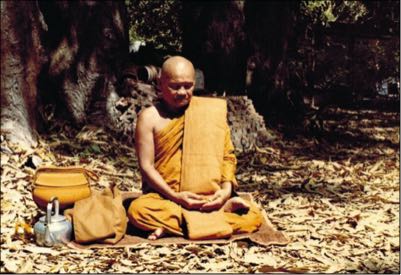




"You make the effort. The Masters only point the Way."
The Buddha, the Dhammapada
"Thinking and wisdom are two very different things. Thinking merely reacts to and follows our moods, and thoughts carry on with no end in sight. But if wisdom is operating, it will bring the mind to stillness. The mind stops and doesn't go anywhere. There's simply knowing and acknowledging what's being experienced. When this emotion comes, the mind's like this; when that mood comes, it's like that. We sustain the `knowing'. Eventually it occurs to us, `Hey, all this thinking, this aimless mental chatter, this worrying and judging it's all insubstantial nonsense. It's all impermanent, unsatisfactory and not me or mine.' Toss it into one of these three all-encompassing categories, and quell the uprising. You cut it off at its source. Later when we again sit meditation, it will come up again. Keep a close watch on it. Spy on it.
"It's just like raising water buffaloes. You've got the farmer, some rice plants, and the water buffalo. Now the water buffalo wants to eat those rice plants. Rice plants are what water buffaloes like to eat, right? Your mind is a water buffalo. Defiled emotions are like the rice plants. The knowing is the farmer. Dhamma practice is just like this. No different. Compare it for yourself. When tending a water buffalo, what do you do? You release it, allowing it to wander freely, but you keep a close eye on it. If it strays too close to the rice plants, you yell out. When the buffalo hears, it backs away. Don't be inattentive, oblivious to what the buffalo is doing. If you've got a stubborn water buffalo that won't heed your warning, take a stick and give it a stout whack on the backside. Then it won't dare go near the rice plants. Don't get caught taking a siesta. If you lie down and doze off , those rice plants will be history. Dhamma practice is the same: you watch over your mind; the knowing tends the mind.
`Those people who keep a close watch over their minds will be liberated from Mara's snare.' And yet this knowing mind is also the mind, so who's the one observing the mind? Such ideas can make you extremely confused. The mind is one thing, the knowing another; and yet the knowing originates in this very same mind. What does it mean to know the mind? What's it like to encounter moods and emotions? What's it like to be without any defiled emotions whatsoever? That which knows what these things are is what is meant by the `knowing'. The knowing observantly follows the mind, and it's from this knowing that wisdom is born. The mind is that which thinks and gets entangled in emotions, one after another precisely like our water buffalo. Whatever directions it strays in, maintain a watchful eye. How could it get away? If it starts to drift over towards the rice plants, yell out. If it won't listen, pick up a stick and stride over to it. `Whack!' This is how you frustrate craving.
"Training the mind is no different. When the mind experiences an emotion and instantly grabs it, it's the job of the knowing to teach. Examine the mood to see if it's good or bad. Explain to the mind how cause and effect functions. And when it again grabs onto something that it thinks is adorable, the knowing has to again teach the mind, again explain cause and effect, until the mind is able to cast that thing aside. This leads to peace of mind. After finding out that whatever it grabs and grasps is inherently undesirable, the mind simply stops. It can't be bothered with those things anymore, because it's come under a constant barrage of rebukes and reprimands. Thwart the craving of the mind with determination. Challenge it to its core, until the teachings penetrate to the heart. That's how you train the mind."
Training the Mind is just like Raising a Water Buffalo Wisdom from the Collected Works of Ajahn Chah
